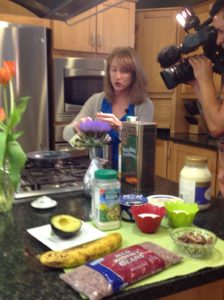This month’s Plaid theme is “Experience.” Though I don’t always stick to the theme, I decided this month, at the year end, is a good time to look back on what I’ve learned in 30 years as a nutrition professional.
- Most people know what they “should eat,” they just need to find their motivation and confidence to do it. This is where I feel that having a professional guide you is a big asset. You are the expert about your own body, lifestyle etc. and sometimes others “telling” you how to eat doesn’t work unless you are open to change. But finding just the right person to guide you to be your best self can be just the thing to get you going in the right direction.
 Volunteer work can lead to wonderful opportunities. Thirty years ago, I volunteered to be a “media representative” for my state’s local dietetic association. In return, I learned how to conduct a radio and TV interview, how to write a press release and how to work with the media in general. Though I’d studied broadcast journalism in graduate school, this “job” gave me the confidence I needed to write, self-publish and promote my first book. I had to pinch myself when staying in a suite at the Essex House, a hotel across from Central Park in New York City, courtesy of Good Morning America. I went on to do hundreds of radio, TV and print interviews, all because I raised my hand to volunteer.
Volunteer work can lead to wonderful opportunities. Thirty years ago, I volunteered to be a “media representative” for my state’s local dietetic association. In return, I learned how to conduct a radio and TV interview, how to write a press release and how to work with the media in general. Though I’d studied broadcast journalism in graduate school, this “job” gave me the confidence I needed to write, self-publish and promote my first book. I had to pinch myself when staying in a suite at the Essex House, a hotel across from Central Park in New York City, courtesy of Good Morning America. I went on to do hundreds of radio, TV and print interviews, all because I raised my hand to volunteer.- Take nutrition studies with a grain of salt. There are good studies, there are poorly done studies and there are mediocre studies that get LOTS of unwarranted press. Even as a nutrition professional, sometimes I can’t tell the difference until I look up the specific study and read it. If you can’t find details of a study, look for words like “randomized control trial”—this is the gold standard for scientific studies. But even observational studies can give us a good idea of what might work. And yes, sometimes the food industry sponsors studies—and those studies are carefully designed to prevent the perception of bias. Because the truth is, government money for studies is hard to find so how else can nutrition studies get done?
- Always beware of nutrition advice that cuts out a whole food group or specific foods. (Yes–I’m talking to you Keto and Paleo.) Though these diets do work if you are trying to lose weight, because to be honest MOST diets Do work in the short term. It’s the long term that’s the challenge.
- Give people the benefit of the doubt and don’t judge. During my entire career as a dietitian, I’ve cringed when I’ve overheard people, family members or even colleagues make comments about people and their eating habits. If you saw me when eating a steak, my favorite chocolate, or putting sugar in my iced tea, you might be thinking, “Wow, she’s a dietitian and she eats THAT?” From my side of things, you shouldn’t judge what a person eats until you’ve eaten a month (or two) of meals from their side of the table.
- Diets and health advice come and go but a few bits of wisdom hang on that can make you healthier, no matter what your health goal. Eat more plants. Move more. Eat real Food. When you eat, enjoy it. Eat and drink in moderation.

Wishing you Happy Holidays and a Hopeful New Year
PHOTO courtesy of Pixabay.com












